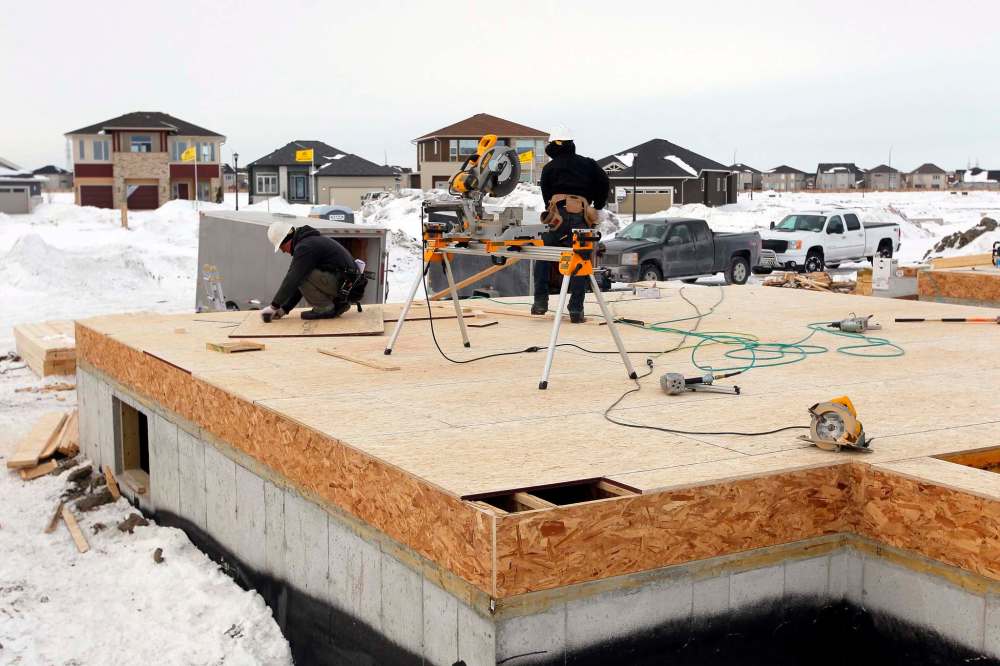Builders shrug off fee-wheeling mayor
Growth-tax idea raised as rules get overhaul
Advertisement
Read this article for free:
or
Already have an account? Log in here »
To continue reading, please subscribe:
Monthly Digital Subscription
$1 per week for 24 weeks*
- Enjoy unlimited reading on winnipegfreepress.com
- Read the E-Edition, our digital replica newspaper
- Access News Break, our award-winning app
- Play interactive puzzles
*Billed as $4.00 plus GST every four weeks. After 24 weeks, price increases to the regular rate of $19.95 plus GST every four weeks. Offer available to new and qualified returning subscribers only. Cancel any time.
Monthly Digital Subscription
$4.99/week*
- Enjoy unlimited reading on winnipegfreepress.com
- Read the E-Edition, our digital replica newspaper
- Access News Break, our award-winning app
- Play interactive puzzles
*Billed as $19.95 plus GST every four weeks. Cancel any time.
To continue reading, please subscribe:
Add Free Press access to your Brandon Sun subscription for only an additional
$1 for the first 4 weeks*
*Your next subscription payment will increase by $1.00 and you will be charged $16.99 plus GST for four weeks. After four weeks, your payment will increase to $23.99 plus GST every four weeks.
Read unlimited articles for free today:
or
Already have an account? Log in here »
Hey there, time traveller!
This article was published 29/02/2016 (3612 days ago), so information in it may no longer be current.
A trial balloon floated by Winnipeg’s mayor has exposed a major gap between the city and property developers as the two sides try to hammer out a deal to determine who pays for infrastructure in new neighbourhoods.
At his 2016 state of the city address, Mayor Brian Bowman said fees levied against developments in new neighbourhoods could help pay for the cost of extending roads, water mains, sewers and other services into these areas as soon as 2017.
New developments generate less revenue than they cost the city in terms of providing services, suggested Bowman, adding growth fees attached to new homes could reduce the burden of paying for services on homeowners in existing neighbourhoods.

“It’s a choice of higher property taxes for all, or higher property prices for some,” Bowman said Thursday during his annual speech, suggesting developers would pass on proposed new fees to property buyers.
While he’s not the first mayor to propose a growth fee — former mayor Sam Katz raised the idea in 2013 — Bowman’s comments carry additional weight because the city is in the midst of formal talks with developers to create new guidelines governing who carries the financial responsibility for extending services into new neighbourhoods and building amenities such as parks, schools, community centres and fire-paramedic stations.
These talks are supposed to take place every four or five years, but the city has not updated its development-agreement framework since 2002, when Glen Murray was mayor.
During the Katz administration, complaints about inconsistent demands made by the city on different developments and developers led the former mayor’s red tape commission to conclude it would be wise to create a single set of standard development agreements.
The intention was to provide certainty for all parties in terms of what’s expected in a given development proposal, thereby reducing the potential for both political interference and private-sector lobbying.
One decade later, the city is finally engaged in the task. In December 2015, a special council committee consisting of finance chairman Marty Morantz (Charleswood), public works chairwoman Janice Lukes (St. Norbert) and property chairman John Orlikow (River Heights) began hearing proposals from the development industry as well as from the city’s planning, property and development department.
The special committee met again earlier this month and is expected to spend another four or five months engaged in the process, said Mike Moore, president of the Manitoba Home Builders’ Association.
“We’re trying to work toward uniform development parameters,” he said. “I’m hoping what we get is a set of parameters we can all live with.”
Moore declined to comment on the specifics of what was proposed, given that the talks are confidential at this stage. He did say he does not expect the city to start raking in additional revenue once an agreement has been reached.
“I don’t see per-unit revenue increasing,” he said, countering the mayor’s suggestion growth charges may be added to individual home sales. Moore said he believes new neighbourhoods do, in fact, pay for themselves. He cast doubt on Bowman’s assertion existing property owners carry too much of the financial burden for services in new areas.
‘It’s a choice of higher property taxes for all, or higher property prices for some’– Winnipeg Mayor Brian Bowman
“One or both of us must be a little bit wrong,” he said, but insisted he’s not going to read too much into the mayor’s comments at this stage.
“I trust it means we’ll have to wait for the results of the development-agreement parameter process.”
Developers have long maintained they cover the cost of extending services into new areas because they pay 100 per cent of the tab for new residential and collector streets, intersection improvements, new water mains and sewers and new sidewalks and 50 per cent of the cost of new nearby regional streets. Developers also set aside land for parks.
Politicians as ideologically diverse as Katz, Bowman and Fort Rouge Coun. Jenny Gerbasi have insisted additional charges are required to pay for schools, fire-paramedic stations and recreational facilities. When Katz floated the idea of growth charges in 2013, he said he did not believe those fees would chase homebuyers away from Winnipeg.
The provincial government immediately quashed the idea, calling it a new tax.
bartley.kives@freepress.mb.ca

